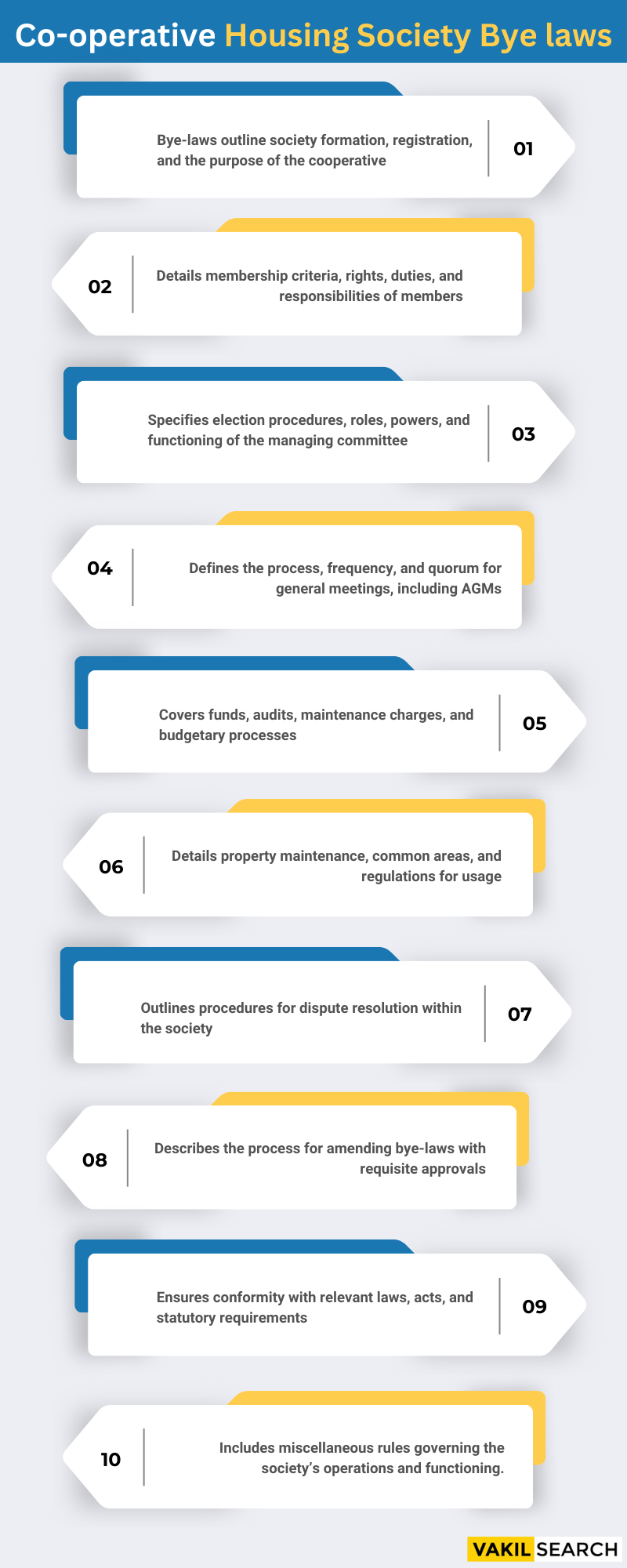A housing society meeting may not appeal to you, especially if petty matters are discussed. It can be exhausting knowing your water pump will be fixed or when your sinking fund will be used. It is crucial to attend these meetings and know your society's rules for two reasons. You own your home, and managing it does not require qualifications. This article discusses Housing Society Bye Laws & Member Rights in depth.
Cooperative society members’ actions are governed by bylaws aligned with regional cooperative acts, such as the Delhi Co-operative Societies Act, 2003; societies can frame bylaws with authority approval, often using model bylaws; states may amend them, but adoption is optional.
Rights of a Member
- Right to inspect the books: As a member, you’re free to inspect, free of cost, the society’s books of accounts during the society’s office hours. You may request the last audited annual balance sheet, or the profit and loss account, and those portions of the books and records in which his transactions with the society have been recorded.
- You may also get a copy of these on payment of a fee (to be decided by the society), if you wish to have them examined by an external auditor. In Maharashtra, an application by a single member alleging mismanagement of funds is enough to begin an inquiry under section 91 of the relevant act.
- Right to vote: Each unit of a housing society is allowed one vote in an election. If your spouse, for example, owns another house in the building, she will also get one vote. It’s not one family, one vote. Even defaulters have the right to vote.
- Right to minutes of meeting: A co-operative can hold two types of meetings for the general body – annual general meeting (AGM) and special general body meeting. The third is a meeting of only the managing committee members. In all three cases, the minutes of the meeting are recorded. If you’ve missed a meeting or wish to know what exactly took place during a managing committee meeting, you may ask for the minutes. Similarly, you may also ask for the act or bye-laws.
Housing Society Bye laws: Registration of Society
A co-operative society is a perfect fit for a residential building as flat-owners have common needs (water connection, watchmen, etc) and interests (maintenance of common areas, such as the terrace and compound). If you’ve purchased a flat in a new building, it would probably be best if you took interest in forming a society.
The builder may also be statutorily obligated to form a society. For example, under Maharashtra Flat Ownership Act, 1963, a builder must form a society within four months of selling 60% of the flats. But you needn’t wait for the builder to form the society. In many states, including Delhi and Maharashtra, ten flat-owners are enough to promote a co-operative housing society.
A building without a housing society usually indicates that there is a dispute between members or a general lack of interest. If you’re considering buying a house in a building where the society has not been formed, find out what the problem is. If the builder does not form a society, rights to the terrace and the compound continue to rest with him. Here’s what you need to do Register a housing society:
1) Apply for registration to the Registrar (forms available at rcs.delhi.gov.in, in the case of Delhi).
2) Along with the application, you need to submit the byelaws the society wishes to adopt and the names and occupations of the promoters of the cooperative.
3) Pay the registration fees. In Andhra Pradesh, this amount will be 1% of the total authorised share capital, subject to a minimum of ₹100 and a maximum of ₹10,000.
4) The minutes of the meeting in which the bylaws were adopted. Each housing society has a share capital, which will be paid up equally by the residents of the society, regardless of the size of the flat. Within six months of allotment, the member should receive a share certificate in this regard, according to the bye-laws of Mumbai.
Co-operative Housing Society Bye laws

What are The Duties of the Secretary of Housing Society Bye laws?
- Maintain accurate records, minutes, and documents of society meetings
- Handle official communication and maintain records of correspondences
- Issue notices for meetings and prepare agendas in coordination with the Chairman
- Maintain membership records, handle applications, and update member details
- Oversee financial records, maintain accounts, and handle banking matters
- Ensure adherence to laws, regulations, and bye-laws concerning the society.
- Prepare reports, annual returns, and required submissions to regulatory authorities.
- Assist in facilitating committee functions and executing decisions.
- Offer administrative assistance and support to the society’s functioning.
- Assist in resolving disputes and grievances within the society.
Roles and Duties of a Treasurer in a Housing Society Bye laws
- Oversee society finances, including budgeting, receipts, payments, and investments
- Maintain accurate financial records, ledgers, and accounts
- Prepare and present financial reports during meetings for transparency
- Assist in creating budgets and monitoring financial health
- Ensure adherence to financial regulations, bylaws, and statutory requirements
- Handle banking operations, manage dues, and financial transactions
- Collaborate with auditors for financial assessments and audits
- Offer financial advice and support to the management committee
- Monitor and manage dues collection and overdue payments
- Provide financial insights and recommendations for effective decision-making within the society.
Conclusion
The bylaws may also be amended by a resolution passed by the general body. Each such amendment must be approved by the registrar, however, in Andhra Pradesh, approval is not required except if the amendment is of strategic interest to the members. For any queries or suggestions leave us your comment below.
FAQs
What are the rights of a member in society?
Members in a cooperative society have rights such as participation in decision-making, access to information, voting rights in meetings, dividends or patronage refunds, right to inspect records, fair treatment, and benefits as per the society's bylaws and regulations.
What are the voting rights of the members in a cooperative society?
Members in a cooperative society typically have equal voting rights, usually based on the principle of 'one member, one vote.' Voting rights empower members to participate in decision-making processes during general meetings, where important matters, including elections and resolutions, are discussed and decided upon.
What are the rights and duties of a member in a cooperative society?
Members' rights encompass fair treatment, participation in meetings, access to information, and benefits according to bylaws. Duties involve adherence to society rules, paying dues, promoting cooperative principles, complying with decisions, and supporting the society's objectives.
What are the liabilities of members of a cooperative society?
Members' liabilities in a cooperative society often include paying dues, liabilities towards the society as per bylaws, following cooperative principles, adhering to decisions made in meetings, and abiding by the rules and regulations established by the society.
What are the rights and liabilities of members?
Members' rights encompass participation in decision-making, access to information, fair treatment, and financial benefits. Their liabilities primarily include paying dues, complying with society rules, following decisions made in meetings, and supporting the society's objectives as per its regulations.




